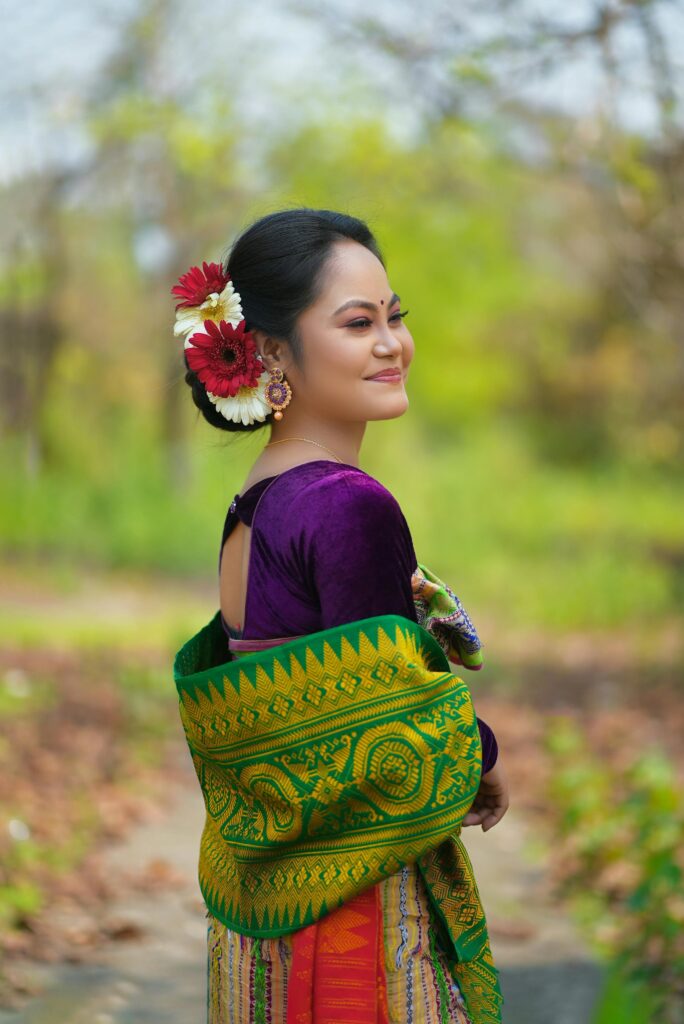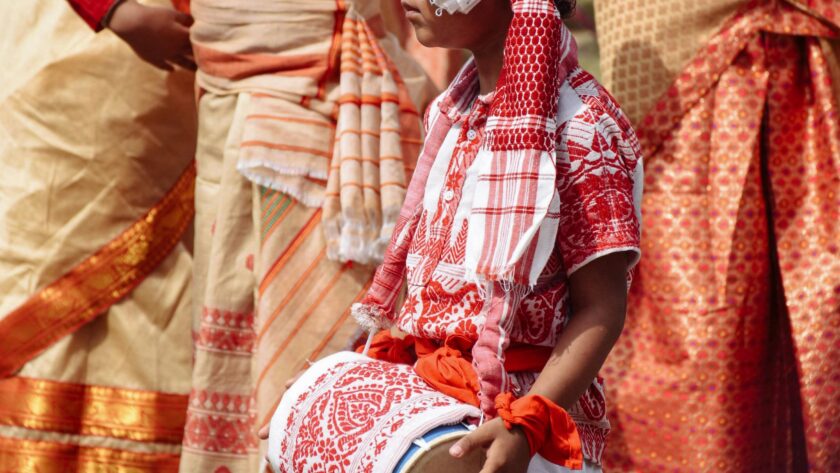Bihu Celebration is the most cherished festival of Assam, it epitomizes the cultural richness of the northeastern Indian state. It is celebrated with unparalleled enthusiasm, this festival transcends religious boundaries and unites people in joy. There are three main Bihu festivals—Rongali Bihu (Bohag Bihu), Kati Bihu (Kongali Bihu), and Bhogali Bihu (Magh Bihu). Each marks a distinct agricultural phase, making it deeply rooted in Assam’s agrarian culture. In this blog, we will explore the vibrant customs, traditional cuisine, and the significance of each Bihu.
What Are the Three Types of Bihu celebration?
1. Rongali Bihu (Bohag Bihu): A New Year Celebration
Rongali Bihu, celebrated in April, marks the Assamese New Year and the onset of spring. It symbolizes new beginnings and fertility. During this time:
- Homes are cleaned and decorated.
- People wear traditional attire, like the Mekhela Chador.
- Traditional Bihu songs and dances fill the air with festive vibes.
Cultural Highlights:
- The Husori performance is a traditional dance accompanied by rhythmic drumbeats and the melodious tune of the pepa (a buffalo horn instrument).
- Young people express love and respect by visiting elders, exchanging gifts, and seeking blessings.
2. Kati Bihu (Kongali Bihu): A Time for Prayer
Kati Bihu, observed in October, has a more somber tone. It is a time for prayer and reflection as farmers await the harvest. Key traditions include:
- Lighting earthen lamps (saki) in fields and near tulsi plants to ward off evil.
- Prayers are offered for a bountiful harvest and the well-being of the community.

3. Bhogali Bihu (Magh Bihu): A Harvest Festival
Bhogali Bihu, celebrated in January, signifies the end of the harvest season. It is known for its feasts and community bonding. Highlights include:
- Uruka Night: Villages come together to prepare grand feasts.
- Meji Rituals: Bonfires are lit, and offerings are made to the gods.
- Traditional games like tekeli bhonga (pot-breaking) add fun to the celebrations.
Traditional Foods for Bihu celebration
No festival is complete without food, and Bihu offers a gastronomic delight! Some popular dishes include:
- Pitha: Rice cakes made with jaggery and coconut.
- Laru: Sweet coconut balls that are both delicious and nutritious.
- Fish Curry: Fresh fish cooked with mustard seeds and spices.
- Rice Beer (Apong): A traditional drink made from fermented rice, enjoyed during Bhogali Bihu.
These delicacies not only reflect Assamese culinary heritage but also provide a chance to bond over shared meals.
The Role of Music and Dance in Bihu Celebration
Bihu is synonymous with music and dance, which are integral to its celebrations. The traditional Bihu dance is a lively performance characterized by swift movements, expressive gestures, and rhythmic beats. Performed in colorful attire, it captures the essence of Assamese culture.
The accompanying music often includes instruments like:
- Dhol: A traditional drum.
- Pepa: A wind instrument made from buffalo horn.
- Taal: Cymbals that add a melodic rhythm.
Why Is Bihu Significant?
Bihu is not just a festival; it’s a way of life for the people of Assam. It celebrates:
- Agricultural Prosperity: Bihu rituals honor nature and express gratitude for bountiful harvests.
- Cultural Unity: It brings together people from all walks of life, fostering a sense of community.
- Preservation of Traditions: By celebrating Bihu, the rich cultural heritage of Assam is passed down to future generations.
How to Celebrate Bihu in Modern Times
While traditional customs remain integral, modern celebrations of Bihu have evolved. Here are some ways to keep the spirit alive:
- Attend Cultural Events: Cities often host Bihu fairs with dance, music, and food stalls.
- Organize Feasts: Gather friends and family to prepare traditional dishes and enjoy a hearty meal.
- Wear Traditional Attire: Embrace Assamese culture by donning Mekhela Chador or dhoti-kurta.
- Participate in Social Media Campaigns: Share your Bihu celebrations online to spread awareness and connect with others.
Frequently Asked Questions About Bihu
1. Is Bihu a Religious Festival?
No, Bihu transcends religious boundaries and is celebrated by all Assamese people, regardless of faith.
2. Can Tourists Participate in Bihu?
Absolutely! Tourists are welcomed to join the festivities, especially during Rongali Bihu, which is vibrant and inclusive.
3. What Is the Meaning of Meji?
A Meji is a bonfire lit during Bhogali Bihu as a tribute to the gods, symbolizing unity and prosperity.
Conclusion: Embracing the Spirit of Bihu
Bihu is more than just a festival; it’s a celebration of life, nature, and community. Whether it’s the exuberance of Rongali Bihu, the solemnity of Kati Bihu, or the feasting of Bhogali Bihu, each phase reflects the cultural richness of Assam. By embracing its traditions and sharing its stories, we keep the spirit of Bihu alive for generations to come. So this season, join the celebrations and experience the vibrant culture of Assam firsthand.




Leave a Reply